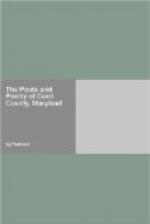The fields have faded, the groves look dead,
The summer is gone, its beauty has fled,
And there breathes a low and plaintive sound
From each stream and solemn wood around.
In unison with their tone, my breast
With a spirit of kindred gloom is opprest,
And the sighs burst forth as I gaze, the while,
On the crumbling stone of the reverend pile,
And list to the sounds of the moaning wind
As it stirs the old ivy-boughs entwined,—
Sighs mournful along through chancel and nave,
And shakes the loose panel and architrave,
While the mouldering branches and withered leaves
Are rustling around the moss-grown eaves.
But sadder than these, thou emblem of love,
Thy moanings fall, disconsolate dove,
In the solemn eve on my pensive ear,
As the wailing sounds of a requiem drear,
As coming from crumbling altar stone
They are borne on the winds in a dirge-like tone,
Like the plaintive voice of the broken-hearted
O’er hopes betrayed and joys departed.
Why dost thou pour thy sad complaint
On the evening winds from a bosom faint?
As if thou hadst come from the shoreless main
Of a world submerged to the ark again,
With a weary heart to lament and brood
O’er the wide and voiceless solitude.
Dost thou mourn that the gray and mouldering door
Swings back to the reverent crowd no more?
That the tall and waving grass defiles
The well-worn flags of the crowdless aisles?
That the wild fox barks, and the owlet screams
Where the organ and choir pealed out their themes?
Dost thou mourn, that from sacred desk the word
Of life and truth is no longer heard?
That the gentle shepherd, who to pasture bore
His flock, has gone, to return no more?
Dost thou mourn for the hoary-headed sage
Who has sunk to the grave ’neath the weight
of age?
For the vanquished pride of manhood’s bloom?
For the light of youth quenched in the tomb?
For the bridegroom’s fall? For the bride’s
decay?
That pastor and people have passed away,
And the tears of night their graves bedew
By the funeral cypress and solemn yew?
Or dost thou mourn that the house of God
Has ceased to be a divine abode?
That the Holy Spirit, which erst did brood
O’er the Son of Man by Jordan’s flood,
In thine own pure form to the eye of sense,
From its resting place has departed hence,
And twitters the swallow, and wheels the bat
O’er the mercy-seat where its presence sat?
I have marked thy trembling breast, and heard
With a heart responsive thy tones, sweet bird,
And have mourned, like thee, of earth’s fairest
things
The blight and the loss—Oh! had I thy wings,
From a world of woe to the realms of the blest
I would flee away, and would be at rest.
FALL OF SUPERSTITION.
A PRIZE POEM.




